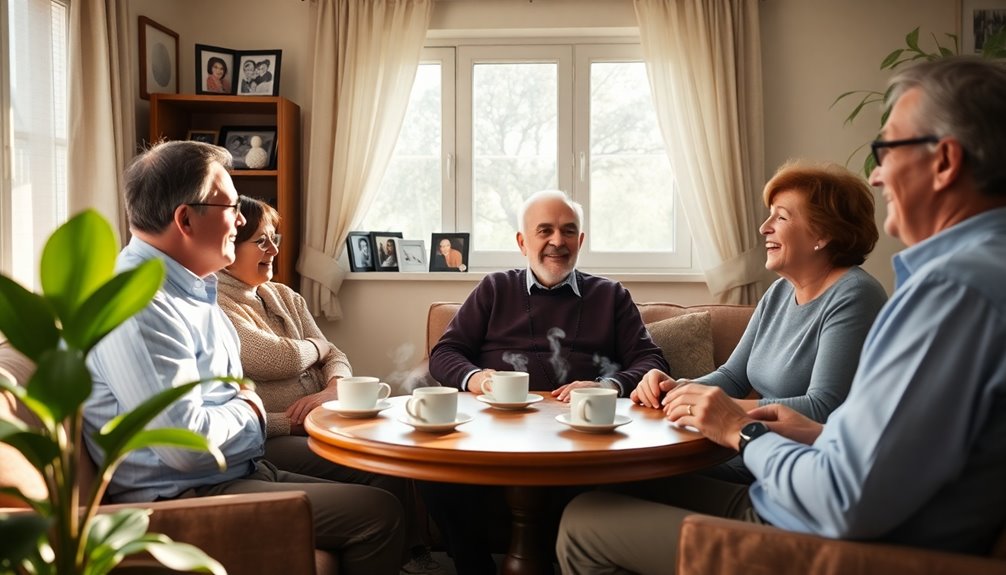Managing life as a widower can feel overwhelming, but you can do it with grace. Start by allowing yourself to process your grief; it's a journey with ups and downs. Establish a daily routine to find normalcy and incorporate self-care practices, like physical activity or journaling, to help manage your emotions. Building a support network is essential; engage with friends or support groups for shared understanding. Embrace new beginnings by exploring hobbies and setting small goals. Remember, it's okay to experience joy alongside your pain. There are many strategies that can help you find peace and purpose moving forward.
Key Takeaways
- Embrace and process your emotions, allowing yourself to feel sadness, anger, and joy as part of the healing journey.
- Establish a daily routine to restore normalcy and create structure in your life post-loss.
- Build a strong support network by connecting with friends, joining support groups, and seeking professional guidance.
- Engage in creative expression, such as journaling or art, to process grief and honor your loved one's memory.
- Set small, achievable goals and explore new hobbies to rediscover personal joy and foster a sense of accomplishment.
Understanding Your Grief Journey
Grief can hit you hard, sweeping you up in a whirlwind of emotions that can change from one moment to the next. Understanding your grief journey is essential, as it's a unique and personal process. You'll likely experience sadness, anger, and guilt, sometimes all in one day.
Remember, the stages of grief—denial, anger, bargaining, depression, and acceptance—aren't linear. You might find yourself moving back and forth between these emotions as you navigate your loss.
Engaging in daily activities and establishing routines can provide much-needed structure during this chaotic time. Consider joining a support group; connecting with others who understand what you're going through can be incredibly comforting.
Sharing your feelings with those who've faced similar losses can help validate your experiences and ease your burden. Journaling or exploring creative outlets can also be effective coping mechanisms, allowing you to articulate your feelings and process your grief.
Recovery requires your active engagement and effort; however, this journey can lead to personal growth and a renewed sense of purpose. It's okay to take your time—healing looks different for everyone.
Daily Life Adjustments

Steering daily life after the loss of a spouse can feel overwhelming, but making small adjustments can help restore a sense of normalcy. Establishing a daily routine gives you structure amid the chaos of grief. Engaging in daily activities, even minor ones, fosters a sense of purpose and mitigates feelings of isolation.
Consider these adjustments:
- Start a daily walk or yoga practice: Physical activity releases endorphins, lifting your mood and promoting emotional well-being. Additionally, engaging in physical activities can help maintain high vibrational energy which is essential for emotional healing. Incorporating a power of attorney can also provide peace of mind, ensuring that someone you trust is prepared to make decisions if needed. Understanding emotional dysregulation can further enhance your ability to cope with grief's challenges. Engaging in activities that reflect mom's interests can also foster a deeper connection to cherished memories.
- Journal your thoughts: Writing helps process your emotions and reflect on your journey, allowing for a deeper understanding of your feelings.
- Reconnect with hobbies: Spending time on activities you love can spark joy and remind you of the good times.
- Schedule regular catch-ups with friends: Social connections are essential for support and can bring laughter and relief during tough moments.
Additionally, exploring local assisted living expenses can provide insights into financial planning, offering peace of mind as you navigate your new life.
Finding joy in these small moments can be healing. Your daily life may look different now, but embracing these adjustments can help you navigate this challenging journey with grace.
Building a Support Network

Steering through life after loss often reveals the importance of having a strong support network. Joining support groups specifically for widows or those experiencing grief can help you find a sense of community and shared understanding, alleviating feelings of isolation. Additionally, engaging in mindfulness and relaxation techniques can enhance your ability to cope with stress during this period. Maintaining an awareness of data privacy can also help you feel more secure when sharing personal experiences online. Creating a routine that incorporates self-care practices can significantly improve your emotional resilience during this challenging time. It's also essential to recognize that the physical effects of narcissistic abuse can manifest in various ways, impacting overall well-being.
It's crucial to engage with friends and family, but remember to set boundaries to prioritize time with supportive individuals who uplift you.
Consider seeking professional guidance from therapists or counselors who can offer coping strategies tailored to your emotional needs. Participating in grief recovery programs with structured activities, like video lessons and group coaching, can facilitate personal growth and healing.
These programs allow you to connect with others who understand your journey, making it easier to navigate your emotions and experiences.
Another therapeutic outlet is writing letters to your deceased partner. This can promote emotional release and help you maintain a connection to the past while also sharing your experience with others who may offer insights and support.
Additionally, understanding the importance of shared responsibilities in co-parenting can help you create a balanced environment for your children during this challenging time.
Processing Your Emotions

Processing your emotions during grief is essential for your healing journey. Embracing those raw feelings, whether it's anger, sadness, or guilt, can help you move forward instead of getting stuck.
Finding creative ways to express yourself, like journaling or writing letters to your loved one, can be incredibly therapeutic.
Embracing Raw Emotions
In the early days following a loss, it's common to feel a whirlwind of emotions that can leave you feeling disoriented. Grief isn't a straight path; it's a unique journey filled with ups and downs. You might experience a mix of feelings, including anger and regret. It's important to validate every emotion you face, no matter how conflicting they seem.
Here are some emotions you might encounter:
- Anger at the situation or even at your loved one for leaving.
- Sadness that can feel heavy and overwhelming.
- Regret over things left unsaid or undone.
- Joy when reminiscing about happier times, often mixed with pain.
Allowing yourself to fully embrace these emotions is essential for healing. Avoiding them might prolong your pain. Remember, it's okay to feel anger, resentment, or sadness; each feeling is part of your grief process. Understanding the importance of self-compassion can greatly aid in your emotional recovery. Moreover, utilizing mindfulness techniques can help you stay grounded during turbulent times. Additionally, recognizing that grief can lead to emotional dysregulation is important for understanding your reactions. It's crucial to remember that emotional healing is a gradual process that requires time and patience. Embracing meaningful experiences can also help you find solace amidst the chaos.
As you navigate this journey, practice patience and self-compassion. Acknowledge the pain, but also cherish the positive memories. This balance can gradually shift your focus from grief to appreciation, fostering emotional healing over time.
Finding Healing Through Expression
Finding ways to express your emotions can be an essential part of healing after loss. Engaging in journaling allows you to articulate feelings and reflect on your experiences, providing clarity during turbulent times. Creative outlets like art and music can transform sadness into powerful forms of expression, facilitating emotional release. Curiosity can also play a significant role in uncovering new insights about your emotions and experiences. Additionally, using humor as a coping mechanism can lighten the emotional burden during the healing process. Including activities that promote emotional well-being can further enhance your journey toward healing. Practicing mindfulness and meditation can also provide a grounding effect, allowing for deeper emotional exploration.
Here are some effective methods for processing your emotions:
| Method | Benefits | Tips |
|---|---|---|
| Writing Letters to the Deceased | Helps release guilt and unresolved feelings | Be honest and open in your writing |
| Journaling | Aids in articulating feelings | Write daily, even if just a few lines |
| Art Creation | Provides a visual outlet for grief | Don't worry about perfection; focus on feeling |
| Music Expression | Allows for emotional release through sound | Create playlists that resonate with your emotions |
| Mindfulness and Meditation | Enhances emotional well-being | Practice regularly to stay present |
Acknowledging and validating your fluctuating emotions fosters a healthier relationship with grief. Allow yourself to explore these expressions, as they're essential steps toward healing. Engaging in trust-building activities can also help reinforce emotional connections during this challenging time.
Embracing New Beginnings

Embracing new beginnings means finding personal joy in everyday moments and building connections with others. You can start by setting small goals that spark your interest and reaching out to friends old and new for support. Incorporating self-care practices into your daily routine can also enhance your emotional well-being during this transition. Engaging in mindfulness techniques can help you stay grounded and present during this challenging time.
Finding Personal Joy
Life after loss can feel overwhelming, but actively engaging in daily routines can help you regain a sense of structure and purpose.
Embracing new beginnings means you can start finding personal joy in unexpected places. Here are some ways to become an active participant in your own healing journey:
- Journaling: Use writing to process your emotions, reflecting on both your grief and your aspirations for the future. It's a powerful tool for rediscovering yourself, much like how educational toys can stimulate cognitive growth in children.
- Explore New Hobbies: Trying out activities you've always wanted to pursue can reignite your passion and motivation, bringing fulfillment beyond your loss.
- Set Small Goals: Establishing achievable targets fosters a sense of accomplishment, encouraging a positive outlook on life and paving the way for new experiences.
- Seek Support: Join groups or communities focused on shared experiences. They can provide encouragement and inspiration as you navigate this journey.
Additionally, consider joining support groups that focus on shared experiences, as they can provide essential encouragement and resources during your healing process.
Each step you take towards finding personal joy is a reflection of your resilience.
Building New Connections
As you rediscover personal joy, building new connections becomes an important step in your healing journey. Engaging with others can alleviate the loneliness and isolation that often accompany grief. Whether through community activities, support groups, or online platforms, these connections foster social interactions and friendships vital for emotional healing.
Here's a quick guide to help you in building new connections:
| Activity | Benefits | Tips |
|---|---|---|
| Support Groups | Shared understanding and encouragement | Attend regularly and engage actively |
| Classes or Hobbies | Meet new people with similar interests | Choose something you enjoy |
| Online Communities | Connect with others who share experiences | Join relevant groups on social media |
| Reconnecting with Friends | Sense of belonging and support | Reach out with a simple message |
Establishing healthy boundaries while prioritizing time with supportive individuals can help you move forward. Remember, nurturing these new relationships can remind you that joy and companionship still exist, paving the way for new beginnings in your life. Embrace this journey with an open heart!
Finding Purpose and Joy

After a significant loss, finding purpose and joy might feel like an uphill battle, but it's possible to rediscover meaning in everyday life.
You've lost your wife, and the void can seem insurmountable. However, engaging in daily activities can provide structure and normalcy.
Here are some ways to help you find purpose and joy:
- Explore New Hobbies: Discovering interests can ignite passion and reveal new aspects of yourself.
- Join Support Groups: Connecting with others who share similar experiences fosters a sense of belonging and understanding.
- Practice Mindfulness: Journaling and being present can help you process emotions, allowing you to find joy in small moments.
- Set Achievable Goals: Establishing small goals creates a sense of accomplishment and motivation, letting you honor your late partner while moving forward.
Frequently Asked Questions
How Long Does a Widower Grieve?
Grief's duration varies for you, often lasting months to years. Your emotions may fluctuate, and it's normal to feel guilt or anxiety. Seeking support can help you navigate this non-linear journey effectively.
What Are Three Things Widows Need?
Did you know 40% of widows feel isolated? To combat this, you need a strong support system, access to grief counseling, and engage in creative outlets. These elements can greatly ease your emotional journey through grief.
Why Is Dating a Widower so Hard?
Dating a widower's tough because they carry emotional baggage and unresolved grief. They may compare you to their late spouse, struggle with guilt, and need time to heal, making genuine connection challenging. Communication is essential.
How Do Widowers Cope With Loneliness?
You cope with loneliness by establishing routines, joining support groups, expressing emotions through creative outlets, and seeking professional help. Engaging with others and finding purpose can transform isolation into connection, fostering healing and resilience.
Conclusion
Steering through life as a widower can feel like wandering through a dense fog, but remember, you’re not alone on this path. Each step you take, however heavy, brings you closer to healing. Embrace the whispers of new beginnings and let them guide you toward purpose and joy. As you build connections and process your feelings, you’ll discover that even in the shadows, light can break through, illuminating the beauty of life’s next chapter. Engaging with others who share similar experiences can be transformative, and attending a death café and its purpose can provide a supportive space to explore your grief. Here, you’ll find a community where conversations about loss are welcomed and encourage healing through shared stories and support. As you navigate this new reality, lean into these connections, for they can offer comfort and understanding, reminding you that it’s possible to forge a new path amidst the uncertainty.









